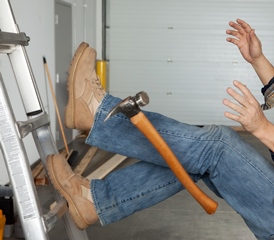Claiming compensation for occupational injuries or diseases
| Description: |
If you’re involved in an accident at work or develop an illness caused by your working conditions, you can claim from the Compensation Fund. Here’s what you need to know.
You can’t claim if you are:
Claims will only be paid if they are submitted in the correct way and on time. Claims will not be paid if:
Who pays into the fund? Employers pay into the Compensation Fund once a month. You do not pay anything towards the fund. Employers can’t deduct money from your wages as contributions to the fund. Which injuries and diseases are covered? The fund covers occupational diseases and workplace injuries. The working conditions and diseases caused by these conditions that are covered by the Compensation Fund are set out in Schedule 3 of the Compensation for Occupational Injuries and Diseases Act (130/1993) (COID Act). You can claim for other diseases if you can prove using medical evidence and reports, that the disease was caused by conditions at work. What can you claim? You can’t claim for pain and suffering, only for loss of movement or use of your body. The amount of compensation paid to you, depends on how much you were earning when you got injured or diagnosed. If you’ve stopped working by the time a disease is diagnosed, the compensation will be worked out according to what you would’ve been earning. Types of compensation: Medical costs All your medical expenses will be paid for up to 2 years, from the date of the accident or the diagnosis of the disease. You are free to choose a medical service provider you want to consult with. All medical accounts should be submitted to the Commissioner, including fees for transporting you to a hospital or to your home. Temporary disability Temporary disability is when you’re unable to work or can’t do all your work because of an injury or disease, but you will get better. To claim, you need to be put off work by a doctor for more than 3 days. If you’re put off work for longer than 3 days, you will get paid out for the whole time that you’re unable to work (including the first 3 days). If you can’t work at all, you’ll get paid out 75% (three-quarters) of your normal monthly or weekly wage. If you can only do some of your work, you will still get paid some wages by your employer. The fund will pay you 75% (three-quarters) of the difference between what you got paid and what you would’ve been paid before the injury. All medical expenses are also paid if the medical accounts are submitted to the Commissioner. You can claim compensation for temporary disability for 1 year. This can be extended to 2 years, after which the Commissioner may decide that the condition is permanent and grant compensation on the basis of permanent disability. Permanent disability A permanent disability is an injury or illness that you will never recover from, for example, losing an eye. The seriousness of the disability will determine whether you’ll never be able to work again or whether you’ll find work more difficult. Disabilities are rated from 100% to 1% depending on the seriousness. For example, a 100% would be the loss of both your hands or the loss of your sight. The loss of your small toe is a 1% disability. Your doctor will write a medical report about the disability. The Commissioner and various other doctors will then decide how serious the disability is. If the disability is more than a 30% disability, you will get paid a monthly pension. The size of the pension depends on what your wages were and on the seriousness of the disability. If you have a 100% disability you will get paid 75% (three-quarters) of your wages. If the disability is less serious, the Commissioner will work out the monthly payment. The monthly payment will be paid for the rest of your life. If the disability is less than a 30% disability, you’ll get paid a lump sum. The lump sum payment is a once-off payment. Death benefits If a family member that earns money to support the family (breadwinner) is killed by an occupational injury or disease, you can claim from the fund. The amount of compensation that you’ll be paid depends on your relationship to the person who died. The total amount paid to the family can’t be more than the pension the dead family member would’ve received. The spouse of the deceased and children under the age of 18 (including illegitimate, adopted and step-children) are entitled to compensation. If there’s no spouse or children, other dependents, like parents, will be paid compensation. To claim compensation for the death of a family member, you need to provide certified copies of:
How do you claim?
Who pays the claim?
NB: Payment of claims can take a long time to process. All forms that need to be submitted to the Commission can be sent to: Email: cfcallcentre@labour.gov.za You can also register online on the Department of Labour's eCOID- Compensation made easy system for online claims. You can contact the Compensation Fund or the Western Cape Department of Labour office for more information and assistance. Forms are available from: 4th and 6th floors |
- Occupational Health and Safety Act, 85 of 1993 (Act) (File type: pdf; size: 114.47 KB)
- Compensation for Occupational Injuries and Diseases Act, 130 of 1993 (Act) (File type: pdf; size: 182.58 KB)
- Compensation for Occupational Injuries and Diseases Amendment Act, 61 of 1997 (Act) (File type: pdf; size: 194.11 KB)





